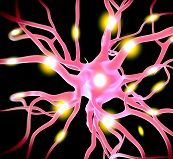Study: Immune System Protein Has Regulatory Function in Brain
Immune system proteins play a role in regulating the number of neural synapses, a research team from Princeton University and the University of California-San Diego report. The finding could mean that one of these proteins-known as major histocompatibility complex class I (MHCI) could play a significant role in Alzheimer's disease, type II diabetes and autism.

Immune system proteins play a role in regulating the number of neural synapses in the brain, a research team from Princeton University and the University of California-San Diego report.
The finding could mean that one of these proteins—known as major histocompatibility complex class I (MHCI) could play a significant role in Alzheimer’s disease, type II diabetes and autism.
Reporting in The Journal of Neuroscience, the scientists wrote that MHCI proteins are already known as immune system couriers that take proteins from pathogens and cancerous cells to T cells, which then kill them.
But in the new research they found the MHCI immune molecules also play several roles in the brain. Those include limiting the density of synapses, which they do by inhibiting insulin receptors. These receptors promote synapse formation, in addition to their usual function of regulating sugar metabolism.
Princeton’s Lisa Boulanger, an assistant professor in the university’s department of molecular biology and the Princeton Neuroscience Institute said MHCI’s roles could mean that changes in this protein’s activity could have an impact on the progression of Alzheimer’s disease, type II diabetes and autism. All have been associated with disrupted insulin-signaling pathways, changes in synapse density, and inflammation, all of which trigger the release of immune system molecules like MHCI, Boulanger explained in an article on Princeton’s website.
Patients with Alzheimer’s disease develop a form of insulin resistance in the brain that is so pronounced some call it type III diabetes, she said in the article.
The protein may also be playing a role in memory loss in Alzheimer’s she said. MHCI levels decline dramatically in the brains of these patients while normal memory depends on having “appropriate levels” of MHCI.
The protein may also be at work in autism, since people with that condition have a surplus of synapses in specific parts of the brain. The team's work changes the common belief that the immune system doesn’t respond to perceived threats in the brain.
“It turns out that MHCI immune proteins do operate in the brain—they just do something completely different,” Boulanger said.